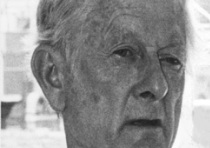A renowned urban planners and a key figure in the revitalized shape of late 20th century, Philadelphia, Edmund Norwood “Ed” Bacon was born in West Philadelphia and graduated from Swarthmore High School in the city’s suburbs.
He received a degree in architecture from Cornell University and worked in Shanghai, China, and Flint, Michigan, before returning to Philadelphia as director of the independent Philadelphia Housing Association.
After leaving the association to serve in the U.S. Navy during World War II, Bacon joined the staff of the Philadelphia City Planning Commission, becoming its executive director in 1949. His major projects included Penn Center and Market East stations and the pedestrian concourse and train lines linking the city’s major suburban rail routes and stations; LOVE Park and other plazas and buildings near Penn Center; development plans for Northeast Philadelphia, with the protection of Pennypack Creek and adjacent open spaces; and the implementation of the Independence Mall redevelopment project.
 Three interstate highways — the Delaware Expressway (I-95), Schuylkill Expressway (I-76), and the Vine Street Expressway (I-676) — were built around Center City during Bacon’s tenure, plans for a fourth, the Crosstown Expressway along South Street, were abandoned following local opposition. His successful redevelopment of the then-rundown Society Hill neighborhood used both historic restoration and large-scale demolition to shape what is now one of the city’s most valuable and picturesque residential areas.
Three interstate highways — the Delaware Expressway (I-95), Schuylkill Expressway (I-76), and the Vine Street Expressway (I-676) — were built around Center City during Bacon’s tenure, plans for a fourth, the Crosstown Expressway along South Street, were abandoned following local opposition. His successful redevelopment of the then-rundown Society Hill neighborhood used both historic restoration and large-scale demolition to shape what is now one of the city’s most valuable and picturesque residential areas.
Bacon left the planning commission in 1970, but continued to speak out about Philadelphia urban planning, protesting the decision to build skyscrapers surpassing the agreed height cap of the rim of the hat on William Penn’s statue above City Hall and criticizing the city council’s decision to ban skateboarding in LOVE Park. He died aged 95; one of his surviving children is the actor Kevin Bacon.
